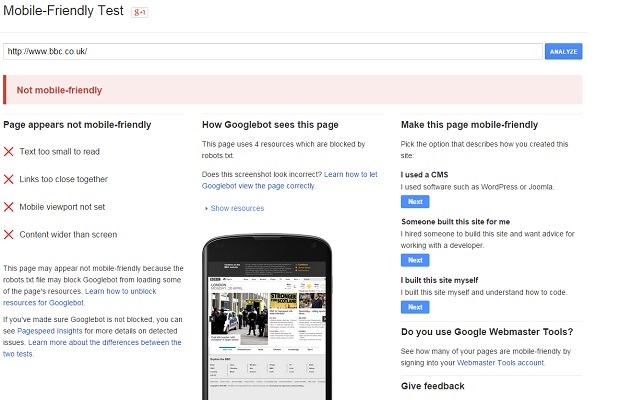Many big brands could ‘disappear’ from Google search results on mobile devices as the web giant changes the way it ranks searches today.
From Wednesday (21st April), Google will prioritise companies that have “mobile-friendly” websites when people use the search engine on their smartphones or tablet computers.
Google says businesses with desktop-only sites will still appear in searches but they will be ranked lower then those tailored for mobile use.
Sections of sites owned by the European Union, the BBC and Wikipedia currently fail the search giant’s Mobile Friendly Test developer tool.
Criteria includes text size, the amount of space between links and whether the content fits across a mobile screen.
Key points about the algorithm change:
• There is no spectrum of ‘mobile friendliness’. Pages are either mobile-friendly or not, as determined by the presence or absence of a mobile-friendly label in mobile search results.
• The algorithm starts rolling out on 21 April, but may take up to “a week or so” to roll out completely.
• People can check their site’s compatability with Google’s Mobile Friendly Test tool
A Google representative said mobile friendliness was “one of many” factors used by the search engine to rank results, but in a blog post the company said it would have “a significant impact” on search results.
“As people increasingly search on their mobile devices, we want to make sure they can find content that’s not only relevant and timely, but also easy to read and interact with on smaller mobile screens,” the representative said.
Google is also offering developer tools for making websites compliant with the mobile-friendly guidelines.
In the UK, adults will spend more time on mobile devices than desktop computers in 2015, according to research from eMarketer.
Brits will spend 2 hours 26 minutes a day on mobile devices excluding voice calling time compared to 2 hours 13 minutes on a desktop.
Google also estimates that around 50% of searches are conducted from mobile devices, through mobile browsers and its own search apps.
But PCs still claim the largest share of internet browsing, with 62.4% of global browsing compared to 31.7% on mobile and 5.8% on tablets in April, according to data from research firm StatCounter.
Desktop global internet browsing has steadily declined, however, from 85.6% in August 2012 through 70.5% in April 2014, as mobile use has increased and tablet and console browsing has stayed steady.

Analysis: mobile and ‘slow’ tags make SEO impossible to ignore
Gregor Rechberger, product manager at Borland, Micro Focus, says: “The move by Google to give priority to mobile websites when users are searching on their mobiles, places further emphasis on the importance of creating optimum-performing mobile-friendly websites to not lose out on vital mobile web traffic and business. However, mobile-friendliness alone will not be enough from a search engine optimisation (SEO) point of view. Google is also currently experimenting with a “slow” tag on its search pages. This red slow label first appeared on a few Android devices a couple of weeks ago, warning users that a site is slow before they click on a search result.
“We know from the past that Google places a lot of emphasis on performance and that it takes speed into account for its search rankings. But it seems that website owners never really prioritised the performance of their website for SEO. Now, with this new red label tag, Google really highlights that it takes performance very seriously – particularly for mobile. Thus, website owners and operators should now take speed seriously and prepare before the slow tag is fully rolled out, or face Google telling their customers that their site is slow! In today’s world, no business can afford to be stigmatized by Google and ignore SEO.”

